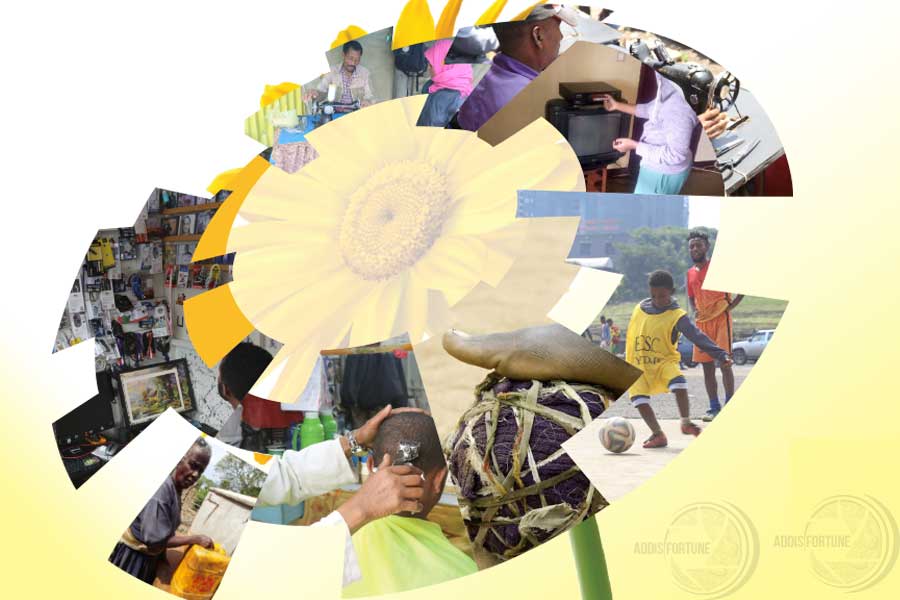
Life Matters | Apr 26,2019
May 6 , 2023
Algorithms have always been part of our lives. We risk losing our autonomy and agency if we are not aware of their power. We must use them wisely and responsibly than become puppets in the hands of unseen masters, writes Tadesse Tsegaye. ( seetadnow@gmail.com )
Savouring the nostalgic ambience of a quaint café, my old coursemate and I were in our world. Surrounding patrons were locked in a digital daze, swiping left and right through social media feeds, seeming to have forgotten the value of true conversation.
I was suddenly reminded of my previous employer who believed in the need for policies, more Machiavellian than managerial. His policies were nothing more than tools of power, employed to keep his minions in line. It was more of his whim that hinges on his mood that ended up being the company’s algorithm—any attempt to cite the policies in his presence used to be met with disdain and condescension.
His actions were a stark reminder of Plato's famous adage that the measure of a man is what he does with power. Unfortunately, this CEO appeared to be using his power for all the wrong reasons, leaving his staff demoralized and dispirited.
Ultimately, his disregard for policies clearly violated Aristotle's belief that "the rule of law is better than the rule of any individual". It was a sad reminder that unchecked power can be dangerous as true leadership requires a dedication to policies that serve the common good rather than the whims of a self-serving few.
My friend was hung up on my use of the word "algorithm," wondering what on earth that had to do with anything.
I tried to explain that our lives are guided by algorithms, from official laws to social norms. It was like watching a light bulb flicker to life in my friend's head, as he realized how the most abstract concepts are woven into everyday existence.
Algorithms have always been part of our lives. It could manifest through a sequence of instructions that controls and manipulates data to achieve a desired outcome. It is a creation that has the power to make or break fortunes, control markets and influences minds. Some might even say that algorithms are the modern-day equivalent of puppet masters, pulling the strings of our digital lives.
When compared to the puppet masters of days past, it is clear that algorithms have taken control to a whole new level. While puppet masters could only manipulate their marionettes' actions, algorithms can manipulate entire populations with a few clicks of a button. Instead of hiding behind a curtain, algorithms are hidden within our devices, constantly collecting data and shaping our behaviour without us even realizing it.
An algorithm is compared to a double-edged sword of progress and oppression. It may offer great benefits, but we must always know its power over our lives.
One might marvel at the sheer cleverness of these intricate systems, praising their ability to automate mundane tasks and revolutionize how we live. On the other hand, they might be a threat to our individuality and freedom, lamenting the fact that we have become so reliant on these soulless machines to guide us through life.
We risk losing our autonomy and agency if we blindly follow the algorithms that control us. We must use them wisely and responsibly than become puppets in the hands of unseen masters.
As we delved deeper into the concept with my friend, the name of our notorious emeritus professor crept up. This intellectual behemoth expected nothing short of academic excellence from his students. His classes were mental marathons that pushed our cognitive limits beyond measure.
He was a perfectionist, with a rigorous class schedule that ran on Mondays and Fridays. In stark contrast to the other instructors, exams were not the sole deciders of our fate in his class. Attending his lectures was mandatory and his expectation for proficiency was unwavering. He had a mission to sculpt and mould us into something grander. Sitting in his class was akin to being in the middle of an intense exam, as questions and challenges shot out of his lips like arrows from a well-stocked quiver. He was unrelenting in his pursuit of excellence, and at the time we griped and groused about the relentless pressure.
Reflecting on those days, we realized that his hard-nosed approach was actually a precious gift. He instilled in us a passion for learning that has never faded over the years. Above all, the man was a research machine, always digging into new ideas and pushing boundaries. I remember how stern he was with office visits, posting a notice on his door and leaving no room for slacking. His relentless pursuit of knowledge is reminiscent through digital media, proving that old algorithms die hard.
An algorithm that is devoid of empathy and consideration for the human element will not be successful.
Just as a well-designed curriculum run by can guide students towards their potential, a functional algorithm can streamline and optimize processes towards efficiency. It is all about finding the balance between theory and practice. Plato once said, "the direction in which education starts a man will determine his future life."
The problem arises when algorithms are blamed for the challenges arising from their implementation.
It behoves us to keep vigilantly informed of algorithms' repercussions on our existence. We cannot blindly accept their utility without consideration, finding ourselves in a world ruled by bits and bytes.
Our challenge is to channel understanding of them for the greater good. As we look towards the predominate algorithm-dominated future, it is only through collaborative efforts that we can hope to thrive in a world that demands versatility and adaptability.
As Plato once said, we can easily forgive a child who is afraid of the dark; the real tragedy of life is when men are afraid of the light. Let us not be afraid to shine a light on the algorithms that govern our lives and work to make them as fair and just as possible.
Laws and regulations can indeed serve as an algorithm for society, providing us with a code of conduct and directions to avoid injuring others.
Social norms function with algorithms, inscribing in our psyche a system of instructions on how to interact with others. Apart from acknowledging their existence, we must learn to regulate them to benefit us. Let us willingly and enthusiastically embrace this new frontier, for it is the only way we control their power in the world.
PUBLISHED ON
May 06,2023 [ VOL
24 , NO
1201]


Life Matters | Apr 26,2019

Radar | Dec 17,2022

Commentaries | Feb 05,2022

Sunday with Eden | Jun 25,2022

View From Arada | Aug 10,2024

Fortune News | Sep 08,2019

View From Arada | Dec 31,2022

Sunday with Eden | Jun 29,2019

Life Matters | Mar 09,2019

Fortune News | Nov 27,2021

Dec 22 , 2024 . By TIZITA SHEWAFERAW
Charged with transforming colossal state-owned enterprises into modern and competitiv...

Aug 18 , 2024 . By AKSAH ITALO
Although predictable Yonas Zerihun's job in the ride-hailing service is not immune to...

Jul 28 , 2024 . By TIZITA SHEWAFERAW
Unhabitual, perhaps too many, Samuel Gebreyohannes, 38, used to occasionally enjoy a couple of beers at breakfast. However, he recently swit...

Jul 13 , 2024 . By AKSAH ITALO
Investors who rely on tractors, trucks, and field vehicles for commuting, transporting commodities, and f...

Oct 11 , 2025
Ladislas Farago, a roving Associated Press (AP) correspondent, arrived in Ethiopia in...

Oct 4 , 2025
Eyob Tekalegn (PhD) had been in the Governor's chair for only weeks when, on Septembe...

Sep 27 , 2025
Four years into an experiment with “shock therapy” in education, the national moo...

Sep 20 , 2025
Getachew Reda's return to the national stage was always going to stir attention. Once...